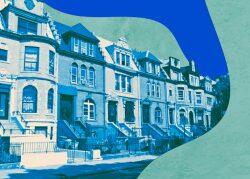When a housing market gets hot and supply shrinks, a certain kind of broker comes a-knockin’.
Just ask Brooklyn homeowners. For several years, residents from East New York to Marine Park have fielded aggressive tactics by real estate agents pushing all-cash offers to entice them to sell.
When the median sale price in the borough broke records in 2018, East Flatbush homeowners reported an ambush of fliers, door knocks and phone calls from aggressive brokers, Bklyner reported.
The decimated inventory and soaring prices that characterized Brooklyn’s housing market this year have driven these brokers to even greater extremes, according to tenant advocacy organizations.
“Solicitation was already pretty aggressive before the pandemic and now it’s just exploded,” said Ivy Perez, policy and research manager at the Center for New York City Neighborhoods, a nonprofit dedicated to preserving affordable homeownership.
“We hear from homeowners that have people showing up at their house leaving flyers or calling them every single day.”
Now, the state is stepping in.
Read more


Gov. Kathy Hochul signed a bill Sunday that requires the Department of State to investigate property solicitation in Brooklyn and decide whether the borough should become a cease-and-desist zone.
The legislation says the zone, in response to “increasingly aggressive real estate solicitation, especially in areas experiencing rapid gentrification,” would give homeowners the opportunity to join a list that would shield them from such overtures.
Hochul’s signature is a big step in that direction. It requires Secretary of State Rossana Rosado to hold a public hearing within the next three months. If she finds the solicitation claims valid, she can establish a cease-and-desist zone for the next five years.
The legislation claims that zones enacted in Queens, the Bronx and Rockland County have “been a proven success.”
rnrn“Homeowners have people showing up at their house leaving flyers or calling them every single day.”rnrn
East New York adopted its own zone last year to stem a barrage of brokers pestering owners in the area. However, Perez said the law has failed to put a stop to solicitations.
“We buy houses” fliers still decorate the neighborhood’s light poles. Homeowners who have submitted their names to the list continue to get calls.
The initial fine for violating a cease-and-desist is around $1,000, Perez said. A second transgression can mean license revocation, but brokerages have been known to use unlicensed actors for reach-outs.
“So it could be a game of Whac-a-Mole,” Perez said.
She predicts that as residents wait for the state to determine whether a cease-and-desist is necessary, the calls, fliers, and knocks will intensify.
The bill Hochul signed was authored several years ago by state Sen. Kevin Parker, who hoped to insulate vulnerable owners — seniors, non-English speakers and folks at risk of foreclosure.
As the pandemic has battered bank accounts, speculative buyers have homed in on distressed owners. With homeowner assistance still awaiting Treasury approval, those struggling to make payments will be a prime target.
“The speculators and the investors are pretty good at finding the sources of vulnerability,” she said. “So I only expect this activity will continue to increase.”
